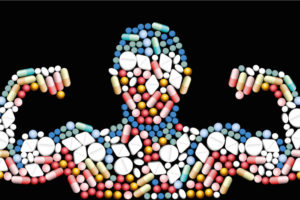Medical detoxification is the process of ridding drugs or alcohol from the body to achieve stability in the body after drug use. It ensures the person going through the process is able to move into a less intensive stage in the continuum of care, and that their body has successfully eliminated all substances from the body.
The withdrawal symptoms an individual should expect during detox will vary based on several factors such as the substance they were abusing, as well as the severity of their addiction. Symptoms of withdrawal are often difficult to overcome without medical intervention, which frequently leads to relapse.
Detoxing in the care of a professional medical detox facility will help the individual avoid relapse and make the detox process easier to overcome. One way to achieve this is to administer medications that assist the client.
Why Use Medications During Detox?

Using drugs to counteract the effects of other drugs? It may seem like a destructive process, but medication-assisted treatment (MAT) allows for a much more comfortable and safe detox for the person going through treatment. Depending on the drug, the withdrawal process can have grave consequences if not treated, and for others, the discomfort can push the person into relapse. Detox medications can help contain unpredictable symptoms or complications that may arise during detox.
There are various medications available that are approved by the U.S. Food and Drug Administration (FDA) for use during detox that range from prescription opioids to over-the-counter supplements. These medications are often implemented during treatment to overcome common symptoms.
These Common Symptoms These Medications Aim To Defeat Include:
- Drug cravings
- Anxiety
- Depression
- Insomnia
- Nausea
- Vomiting
- Diarrhea
- Muscle pains
Detox medications are also utilized to wean someone off of a substance by tapering down the dosage slowly rather than trying to stop cold turkey and triggering life-threatening symptoms such as seizures.
What Medications Are Used In Detox?
Doctors will typically use over-the-counter medications like Dramamine to cope with nausea, Tylenol for aches and pains, and natural supplements such as melatonin for insomnia. Depending on the substance the individual is detoxing from, prescription anti-depressants can be used to help alleviate the symptoms of depression and suicidal thoughts.
Detox Medications For Opioids
With the opioid crisis affecting so many in the country, there has never been such a high influx in those seeking treatment. Fortunately, whether someone has been using prescription opioids like Vicodin or illicit, more potent drugs like heroin, detoxing from opioids is rarely life-threatening. Still, opioid withdrawal can be extremely uncomfortable, with painful and unpleasant withdrawal symptoms. The symptoms commonly associated with opiate withdrawal involve all of the general substance withdrawal symptoms listed above, including:
- Restlessness
- Exhaustion
- Fever and chills
- Agitation and mood swings
- Rapid or irregular heartbeat
- High blood pressure
- Difficulty concentrating
- Tremors
- Uncontrollable crying
Depending on which opiate drug in question and the severity of the addiction, it’s possible not to experience all of these symptoms; however, dealing with a few can become overwhelming without professional guidance and support. Even milder symptoms such as diarrhea, vomiting, and sweating can lead to dangerous levels of dehydration if not monitored.
Some detox medications used to help treat opioid withdrawal are actually other, weaker opioids. The opiate drugs are used for the double-purpose of containing drug cravings and well as weaning users of stronger drugs like heroin or fentanyl.
Common opioid detox medications include:
Methadone:

Methadone has one of the longer histories when it comes to MAT in opioid detox. Methadone is strong enough to combat cravings, but still weak enough that, when administered carefully by a medical professional, it does not get the user intoxicated.
Methadone is medically useful because of long the effects last. It can remain in the body anywhere from 15 hours to 55 hours, depending on the dosage, and replace short-acting opioids like heroin and take up space in the brain’s opioid receptors.
The objective of methadone during detox is to replace the opiate the user is detoxing from, followed by a steady lowering of the methadone dose to achieve sobriety.
Buprenorphine:
Buprenorphine is another opioid used to achieve the same effects as methadone. The difference, however, is that buprenorphine is a “partial opioid agonist,” which makes it much weaker than “full agonist” opioids and decreases the addictive potential.
The medications work similarly and take up space in opioid receptors to ease cravings and keeping other opioids out to block the euphoric effects associated with opioid intoxication. A standard dose lasts around 24 hours.
Although the drug is much weaker, buprenorphine during detox requires accurate administration as well as monitoring. It can still be abused and possess the potential for dependency.
Suboxone:
Suboxone is the name-brand version of the combination of buprenorphine and naloxone. Naloxone is considered a “full opioid agonist,” which means that it negates the effects of opioids entirely, switching off the brain’s opioid receptors.
Naloxone is used under the name Narcan to reverse overdoses, but it is too strong to handle on its own during detox. Suboxone is designed to combine the most beneficial effects of buprenorphine and naloxone to make a medication that is less likely to be abused.
Detox Medications For Depressants
Alcohol benzodiazepines like Xanax or Valium, as well as non-benzo sedatives and barbiturates, are all grouped together as central nervous system (CNS) depressants. These substances all contain the potential for dangerous withdrawal symptoms.
Common Withdrawal Symptoms Include:
- Hallucinations
- Panic attacks
- Migraines
- Severe insomnia
- Suicidal behavior
- Delirium tremens
- Seizures
- Disassociation
- Psychosis
- Memory loss
- Tremors
- Uncontrollable crying
- Increased heart rate
- High blood pressure
- Vivid nightmares
The common medications used to medically treat depressant drugs are antidepressants, melatonin, and anticonvulsants in the case of seizures. In some instances during benzo treatment, other benzos will be administered to wean the client off and avoid adverse effects.
Detox Medications For Stimulants
Stimulants are viewed differently than other substances because the symptoms involved with stimulant withdrawal are mainly mood-based and psychological versus flu-like symptoms such as nausea and vomiting.
The reason behind this is because most stimulants focus on a brain chemical known as dopamine, which regulates emotions, cognition, feelings of pleasure, and motivation. Other common withdrawal symptoms such as depression, anxiety, and insomnia can be accompanied by:
- Suicidal behavior
- Impaired cognition
- Migraines
- Concentration problems
- Agitation and mood swings
- Extreme fatigue
- Vivid nightmares
- Emotional numbness
- Dulled senses
- Disassociation
- Impaired memory
There are no medications that are currently approved for stimulant detox, but many facilities will use anti-depressants, muscle relaxers, modafinil, which is a medication mean to treat sleep disorders, and sometimes buprenorphine.
Related pages
National Institute on Drug Abuse. (2018, March 06). Prescription CNS Depressants. Retrieved from https://www.drugabuse.gov/publications/drugfacts/prescription-cns-depressants
NIDA. (2018, June 6). Prescription Stimulants. Retrieved from https://www.drugabuse.gov/publications/drugfacts/prescription-stimulants
Drugs.com. ((2019, November 4) Suboxone. Entringer, S. PharmD. Retrieved from from https://www.drugs.com/suboxone.html
Drugs.com. (2019, October 14) Buprenorphine (oral/buccal). Cerner Multum Retrieved from https://www.drugs.com/mtm/buprenorphine-oral-buccal.html
Drugs.com. (2019, November 1) Methadone. Sinha, S. MD. Retrieved from https://www.drugs.com/methadone.html
Opiate and opioid withdrawal: MedlinePlus Medical Encyclopedia. (n.d.). Retrieved from from https://medlineplus.gov/ency/article/000949.htm
National Institute on Drug Abuse. (n.d.). Pharmacotherapies. Retrieved from from https://www.drugabuse.gov/publications/principles-drug-addiction-treatment/evidence-based-approaches-to-drug-addiction-treatment/pharmacotherapies
SAMHSA. (2019, September 9) About MAT. Retrieved from https://www.samhsa.gov/medication-assisted-treatment
SAMHSA.(2006) Detoxification and Substance Abuse Treatment. TIP 45. Miller, N. M.D., FASAM. Kipnis, S. M.D., FACP Retrieved from https://www.naabt.org/documents/TIP45.pdf
Treatment, C. F. (1970, January 01). Chapter 3. Intensive Outpatient Treatment and the Continuum of Care. Retrieved from https://www.ncbi.nlm.nih.gov/books/NBK64088/

